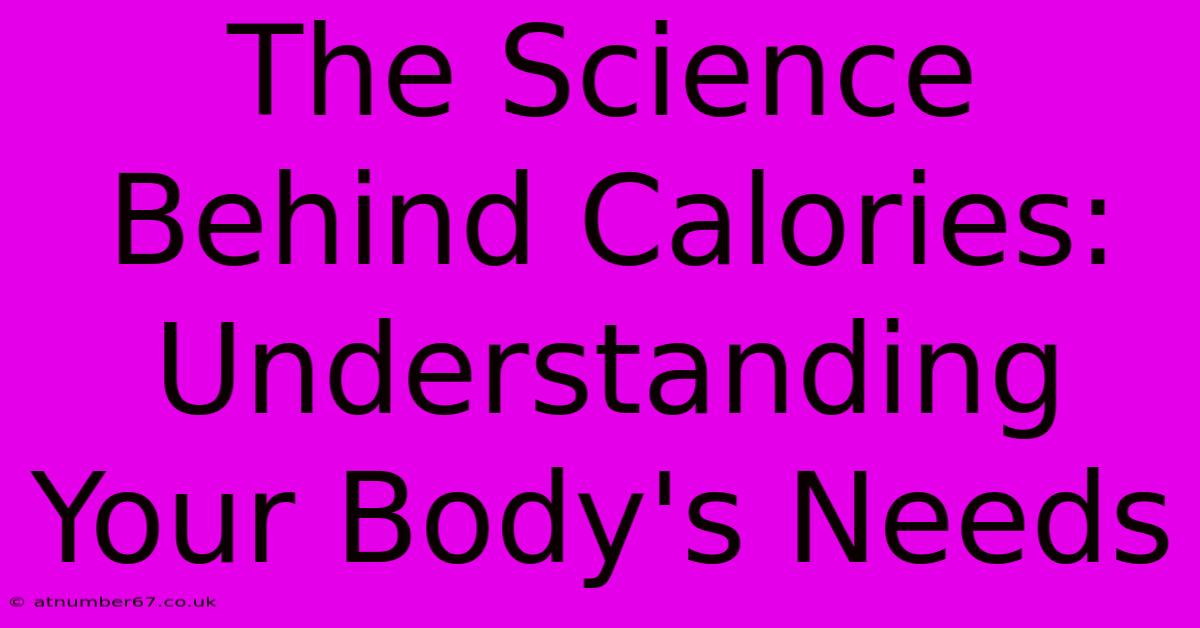The Science Behind Calories: Understanding Your Body's Needs

Table of Contents
The Science Behind Calories: Understanding Your Body's Needs
Understanding calories is crucial for anyone aiming to manage their weight, improve their health, or simply optimize their energy levels. But what exactly are calories, and how do they impact our bodies? This article delves into the science behind calories, explaining their role in metabolism, energy expenditure, and overall well-being.
What is a Calorie?
Simply put, a calorie is a unit of energy. More specifically, it's the amount of energy needed to raise the temperature of one gram of water by one degree Celsius. In the context of nutrition, we're talking about kilocalories (kcal), often shortened to "calories" on food labels. These kilocalories represent the energy our bodies derive from the food and drinks we consume.
Different macronutrients – carbohydrates, proteins, and fats – provide varying amounts of calories:
- Carbohydrates: 4 calories per gram
- Proteins: 4 calories per gram
- Fats: 9 calories per gram
Understanding this breakdown is vital for creating a balanced diet that meets your individual caloric needs.
Caloric Needs: More Than Just Numbers
Your daily caloric needs aren't a one-size-fits-all number. Several factors influence how many calories your body requires:
-
Basal Metabolic Rate (BMR): This is the number of calories your body burns at rest to maintain basic functions like breathing and heartbeat. BMR is influenced by factors such as age, sex, weight, and muscle mass. Generally, a higher muscle mass leads to a higher BMR.
-
Physical Activity: Exercise significantly increases your caloric expenditure. The intensity and duration of your workouts directly impact the number of extra calories you burn. This is where regular activity plays a crucial role in weight management and overall health.
-
Thermic Effect of Food (TEF): Digesting, absorbing, and processing food also burns calories. This effect varies depending on the type of food consumed. Protein has a higher TEF than carbohydrates or fats.
-
Age and Gender: Metabolic rate naturally slows down with age, affecting caloric needs. Gender also plays a role, with men typically having higher BMRs than women due to differences in muscle mass and body composition.
Calorie Surplus vs. Calorie Deficit: The Foundation of Weight Management
The relationship between calorie intake and weight management is fundamental.
-
Calorie Surplus: Consuming more calories than your body expends leads to weight gain. The excess energy is stored as fat.
-
Calorie Deficit: Consuming fewer calories than your body expends leads to weight loss. Your body uses stored fat for energy.
It's crucial to note that creating a significant calorie deficit can be detrimental to health. A gradual and sustainable approach is always recommended, ideally guided by a healthcare professional or registered dietitian.
Beyond Calories: The Importance of Nutrient Density
While calorie counting can be a helpful tool, it shouldn't be the sole focus. Prioritizing nutrient-dense foods – foods packed with vitamins, minerals, and antioxidants – is equally crucial for overall health and well-being. These foods provide essential nutrients regardless of their caloric content.
Seeking Professional Guidance
Understanding the science behind calories is a powerful first step towards better health. However, individual needs vary significantly. Consulting a registered dietitian or healthcare professional can provide personalized guidance on determining your caloric needs and creating a balanced, sustainable diet plan tailored to your specific goals and circumstances.
Keywords: Calories, calorie needs, weight management, metabolism, basal metabolic rate (BMR), physical activity, thermic effect of food (TEF), calorie deficit, calorie surplus, nutrient-dense foods, healthy eating, weight loss, weight gain, nutrition, diet, health.

Thank you for visiting our website wich cover about The Science Behind Calories: Understanding Your Body's Needs. We hope the information provided has been useful to you. Feel free to contact us if you have any questions or need further assistance. See you next time and dont miss to bookmark.
Featured Posts
-
Que Son Los Metodos Anticonceptivos Debunking The Myths
Apr 01, 2025
-
Shakeel Mohameds Age A Biography Highlight
Apr 01, 2025
-
The Future Of Speedrunning And Age
Apr 01, 2025
-
Samuel Onuha Net Worth And Business Opportunities
Apr 01, 2025
-
Birthstone Necklace Make Her Feel Extraordinary
Apr 01, 2025
